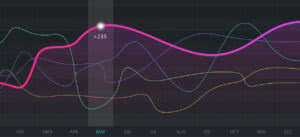The data you collect from your events is hiding all sorts of insights – information that could be very valuable if you know how to use it.
Analysing the stats can show you what marketing campaigns are working, which ticket types are most popular, who’s buying, when and how. Ultimately, exploiting your data can show you how to sell more tickets and make more money.
The good news is you don’t have to be a data scientist to extract useful findings from your event data, as Eventbrite’s Anna Zawadzka explains…
Why is capturing customer data so important for event organisers?
It allows you to better understand the audience and it gives you the opportunity to better tailor the ticket purchase experience. It also offers you much greater control over and insight into the sales and marketing process. Ultimately this enables you to sell tickets more effectively and potentially increase sales for future events.
Capturing and analysing data can seem like a daunting task. Is this the case?
Capturing and analysing data is really straightforward on Eventbrite. Not only does Eventbrite offer standardised reports like the Attendee Summary, Sales by Ticket Type or even the exact data around Check-Ins at the event, but organisers also have the option to create and customise their own reports based on the information that’s relevant to them. Eventbrite also offers the option to schedule email reports, sent to the organiser on a weekly, monthly or daily basis.
When setting up your event registration, you simply select the information you’d like to include, which range from address and phone number to job title and company. There is also the option to create Custom Questions for anything that’s not listed on the standard order form. This is another level of customisation enabling you to request information on things like special dietary requirements. You can also add a waiver, which you’d need for an endurance event.
Eventbrite offers an integration with a number of different CRM systems, so if you already have a Salesforce account, for example, you can have the data synced automatically into your database, which makes working with the data you collect really easy.
How much data should be collected in the purchase process? Can you ask too many questions?
You can definitely ask too many questions. It’s important to distinguish between the order form and the post-event survey and only collect what you need at this stage. You don’t want registrants to feel like they’re filling out a long questionnaire that doesn’t relate to the event anymore, as this could negatively affect conversion.
That’s why it is so important to select the information you want to collect during registration. You can choose just the basic information (first and last name and email address of person buying the tickets) or you can choose to collect more in-depth information for each attendee. It’s important to bear in mind if you choose to collect data for each attendee (rather than just the purchaser) and someone is registering for five tickets, lots of questions could really create some frustration.
In an attendee’s journey registering for an event, the questions need to be aligned with the purchase flow. There is always the option to ask further questions by using our Emails to Attendees Tool (for future events for example). If you have vital additional information to collect for each attendee, such as waivers, you have the option to change the amount of time allowed for registration. You don’t want to lose potential customers because their session timed out.
What reports from the Eventbrite Dashboard are the most useful in the lead up to an event?
In the run-up to the event, there are a number of reports that can help guide your marketing activities. The Sales Summary lets you monitor ticket sales and has graphs that let you easily see the impact of marketing activities. And if you see your sales starting to drop off, you can take action.
The Promotion Code Usage report lets you track the performance of certain promotional activities you’ve launched. And reporting around tracking links will show you the performance of affiliates who promote your event outside of Eventbrite, which can also help you hone your strategy. Meanwhile, the Attendee Geography report lets you see where registrants are coming from and you can use this intelligence to perhaps increase your marketing in those areas where you see a lot of interest.
How can an organiser use their customer data to increase sales?
With our self-service tool for Facebook tracking pixels, organisers can follow the customer journey and it gives you a lot more information. For example. if you have an abandoned order or discover a place in the customer journey where people drop off, you might realise people get stuck on the order form and you can make changes accordingly.
Meanwhile, analysing the marketing channels that are working best for you means you can better allocate your resources. You can concentrate your budget where it will drive the best results. Customer data is also extremely valuable for the planning of future events.
Why is real-time data collection important?
The data in Eventbrite is updated within seconds of a purchase being made, which means you can react and make changes quickly. If you see poor sales, you can change the marketing of an event or try a different strategy. Or if you see a particular marketing channel working really well, you can put more budget into it. Thanks to the Event Attendance by Time report, you can view in real-time how many attendees have already checked in at your event as well.
Last but not least, the event dashboard shows you up-to-the-minute web traffic, sessions and tickets sales data, which is really valuable when making decisions on the fly.
What is the importance of owning your customer data?
It’s important to own the data you collect so you can build a database. On Eventbrite, you can email attendees and create contact lists based on your past events. If you want to advertise future events to them you can email them straight from the dashboard or export a contact list. We’re not a CRM but we still capture the data in one place and organisers can use that to their advantage. This would give them the opportunity to plan and generate revenue by building a long-term relationship with their customers.
How can customer data be used to make for a better event next time?
We have an integration with SurveyMonkey which you can use post-event for asking questions you don’t want to ask during registration. This can really help you shape your event experience.
You can also use your customer data to analyse the demographic of those who attended and the marketing channels or offers they responded to, and this can help you to get to know them better.
What other opportunities have you seen arise from organisers using their data correctly?
Organisers have identified opportunities for growth and expansion by looking at factors such as the geography of their attendees. Where they’ve seen a lot of interest outside of their catchment area, they’ve been able to identify new event locations.
Likewise, it helps guide them on the ticket prices and timings to best drive sales. The Sales by Ticket Type report shows which ticket type sold the best and how quickly they sold out. It gives you an idea how many tickets in each type you should make available or what time you should make early bird tickets available.
You can also target your most valuable customers by creating a filtered contact list of those who purchased your premium ticket, for example. If you’re planning on hosting a similar event you can immediately reach out to the group who could afford this package.
Conclusion
Your event data is worth its weight in gold – don’t let it go to waste. Pull your reports now to discover the insights that will help you boost your ticket sales and plan even better events in future.
If you’d like to find out more about how Eventbrite can help your event, contact us now and speak with one of our experts.





